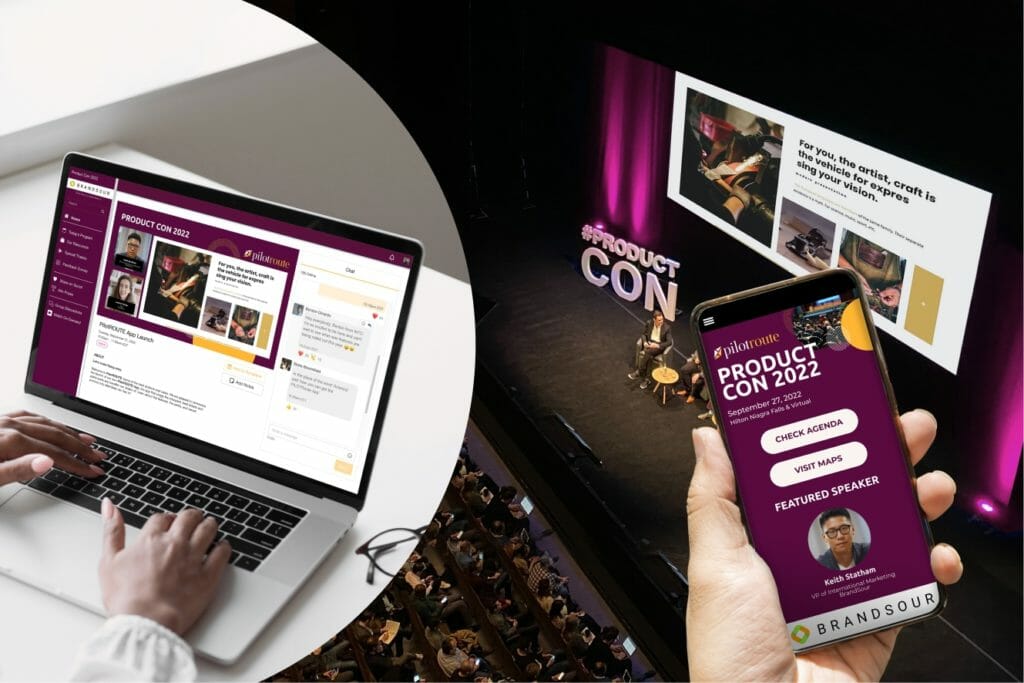
Is hybrid events a temporary solution to current events or a long-term shift within the events industry? We asked Event Planners whether they plan to use mixed events in the future and, if so, their thoughts on how it will work.
A mix of In-Person and Virtual events will be around for the long term. The Covid-19 lockdown taught us that people could collaborate, work, and celebrate together even if they were not physically present. Event professionals must acknowledge the ability to bring together multiple attendees from around the globe and still accomplish the event’s goal.
We can host small- to large-scale events, meetings, conferences, and weddings by using Livestreaming and working with Virtual Event Providers. Virtual providers can create an almost real experience by using virtual lobbies and networking. They also allow real-time attendees interaction, polls, games, and other activities.
We will see the benefits of travel and accommodation savings and the possibility of having more attendees and delegates by offering a hybrid event that is both virtual (in-person) and will feel a sense of normalcy after COVID.
Virtual production partners and event managers are essential to ensure high-quality production and delivery.
Our current customers have been extended virtual event services! Although I still need to be ready to make this available to the public, I will be able to do so shortly. Virtual events seem easier than live events, but they aren’t! Virtual events are almost as challenging as live events. Virtually, you aren’t physically there. However, attention to detail and physical exhaustion are still present in a virtual environment.
I learned technology is more challenging to use than I thought. It’s fantastic to see the challenges that different operating systems present, including tablets vs. smartphones vs. tablets. These challenges are crucial for virtual events because your attendees will face them. As excited as I am about adding a virtual service, I have to be careful to ensure that my team and I can manage a virtual event with as much confidence as we would in a live event. We also need to be able to help attendees navigate new technology.
Although the virtual event experience will continue to be integral to event professionals’ solutions for clients, I know that face-to-face interaction and contact are unparalleled. Although I doubt the virtual event experience will be as popular as it was in the past, I believe it will become an additional element to live events, allowing for more excellent attendance by attendees who cannot travel because of scheduling conflicts, distance, or other physical limitations. It would be a huge game changer if we combined a tremendous virtual experience and a live experience.
Although events have high costs, I hope everything is comparable. Perks shouldn’t be the focus of an event, either for the sponsor or the planner. Sponsors need exposure and volume, so offer them this and help them communicate with attendees. You can mail the swag directly to your attendees or make it virtual with QR codes and digital downloads. Both audiences should feel connected and engaged, not like they are attending two different events simultaneously.
People are finally learning to respect their time, energy, and other responsibilities. Because of their family, pets, work responsibilities, personal health, and financial commitments, not everyone can commit to attending a conference for five days. We need to stop thinking that companies pay all conference expenses.
We are not only missing out on the feedback and input from everyone who cannot attend due to the reasons I mentioned above, but we also homogenize our attendees. This is when you fall into the trap of doing the same thing repeatedly for the same people.
Hybrid events allow you to reach a wider audience and having people’s opinions and experiences helps to make the event more successful. Everyone benefits from diversity. This is how you learn, and it’s also how you grow. Planners must consider both the audience and how to make them feel involved.
This weekend was our first hybrid event. The event went well, but there are many things you need to think about when hosting a mixed affair. You have two types of guests/attendees. It is very different from how live guests interact with each other. The planner should ask the host to decide which will be prioritized on the event day.
Planners need to identify what they are looking for and provide their clients with the right platform and support to host their online events. They must also plan the in-person event and know that the online experience cannot replace the personal experience. This includes adding tech staff to the space and welcoming and accepting the online event schedule. It is essential to determine who the primary audience is and how you plan the event.
The online audience must be able to digest the information in smaller chunks. Live events in person can take up to several hours and sometimes even days. Online attendees will require different breaks and opportunities to network and share their experiences with the other in-person attendees. The two audiences (or more, in the case of hub events) may need to have the opportunity to meet.
Planners will want to vary the content that they share online. They will only be able to take a break for coffee or eat at a different time than the in-person attendees. You will want them to do this independently without making them feel obligated to attend the event. Planners will need to consider other ways to keep online attendees interested. These experiences will be different from the in-person ones.
Another problem is that many proven platforms that could be an excellent fit for the event goals need to be sold out. Many of the most experienced tech teams, moderators, hosts, and panelists are booked up in advance. There is high demand for hybrid events. This means that there will be many platforms. The planner must understand and verify the differences to ensure a smooth event. To offer the best solutions to their clients and event planners, the planner needs to understand each provider’s requirements.
As more events adopt hybrid events and reap the many benefits, mixed events will be here to stay. The most significant advantage of hybrid events is their ability to grow in size exponentially. Although there will be limitations in the future regarding the number of attendees who can attend the event in person, online guests are virtually limitless. You can now reach people all around the globe without having to worry about travel costs and schedule conflicts. You can also share and view parts of the content later with post-viewing. This is similar to the DVR, Amazon Prime, and Netflix (and other subscriptions) used for movie and TV viewing. Many events will benefit from adding an online component to their circumstances and embrace the online audience long after the in-person events have been deemed safe and accessible.
Another advantage that can be huge depending on your event’s goals and objectives is the ability to gather data about your attendees. You can track the paths of your attendees through the event by interpreting polls and monitoring their movements. This will allow you to see which areas received the most chatter in social media, live chats, Q&A, or chats. It also allows you to gather data about the places your event reached. This data can be used by the event team, sponsors, and marketing teams to analyze and refocus sales and improve event content.
This allows us to learn more about how people connect online and add that to solid content and education. This could increase the reach of your event far beyond what it could have been with only the in-person portion.
You will have more opportunities to reach sponsors and more net earnings for the event if you get more people. Although virtual space doesn’t have all the restrictions of physical space, we can still keep the face-to-face aspect in place for those who prefer it.
People will change how they attend events in person or virtually after COVID-19 passes. If they had participated in 4 live events per year before COVID-19, they could now attend two more in person and even more virtual. Because they can access more events virtually, there is less time and cost involved than following all the events in person.
Virtual events outsell live events when it comes to selling tickets. This is because more people can reach you from anywhere, and you don’t have to travel. Because of its virtual nature, there will be fewer costs on-site and a more significant net profit.
Virtually every participant must have the same experience as those in person. Hosting both sides of a hybrid event is less expensive. The virtual ticket costs 30% more than an in-person ticket. Although there is still some production involved for virtual keys, the extra A/V costs will not outweigh any cost savings from having a smaller venue and fewer food & beverage costs.


